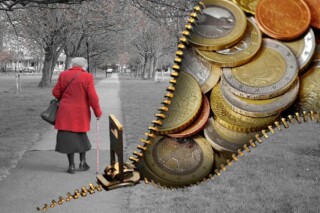Good morning! You’re reading a daily contextual review of the news that marked the previous day.
By Ljubomir Filipović, CdM observer
Serbian church, Serbian world and elections in Nikšić
Apart from ‘ethnic’ topics, religious topics are starting to emerge in Nikšić. First the Prime Minister burned badnjaks with bishop Joanikije in this town, after which the local PzP Board hung a photo of Mr Medojević and bishop Joanikije on their window, thus wanting to prove its commitment to the religion. Then URA recorded a video showing Christians’ support for Mr Dritan Abazović (?!), while the Democrats submitted the list under the slogan ‘Let heavens hear’. The clericalization of politics and society has reached the tipping point. The rector of the Cetinje school of theology, Gojko Perović, again mentioned that theology should be introduced in schools, whereas bishop Joanikije endorsed the coalition between PM Zdravko Krivokapić and Parliament Speaker Aleksa Bečić in Nikšić. The Prime Minister enthusiastically pledged the liberalization of the Citizenship Law which would allow people who have been living in Montenegro for years to get a citizenship. He didn’t exactly say how he meant to do it. But we’re well aware that it’s not about his good intentions – it’s rather a strategic pre-election planning. By playing with the citizenship law, Montenegro can easily suffer a large demographic and consequently political change of the outlook, which may lead to constitutional changes that may threaten its independence. Especially in the light of announcements from the PM’s circles that possession of Montenegrin origin should be a criterion for granting citizenship.
Currrent divison in the Serbian world on pro-Vučić and anti-Vučić people in Montenegro means nothing. URA cannot be perceived as the contral figure, not to speak about other members of the ruling coalition. Their rhetoric is clerical, revisionist, and ethno-nationalist. While the URA accuses Montenegrins for nationalism, their youth is led by people who burn books of Mr Veseljko Koprivica because he dared to criticize Metropolitan Amfilohije. To be specific, it is about Mr Dušan Ljumović, an official of the URA who bragged on Facebook about burning Mr Veseljko’s books, but also about some others whom we recently mentioned to have used Nazi symbols.
Under Metropolitan Amfilohije, the Metropolitanate of Montenegro and the Littoral had certain autonomy within the Serbian church, which was exclusively dependent on his personal authority. Bishop Joanikije does not have that kind of strength, although he gained popularity among the believers of the Serbian Orthodox Church in Montenegro. The MCP is now aware that by choosing Gojko, who’s close to Vučić, it’ll even more lose that privileged position within the church, will have to average herself and forget dreams about the archbishopric. For that reason, with assistance of the media, the MCP is setting itself up as a barrier, opposing Belgrade, in order to present the Montenegrin opposition as extreme. It’s why bishop Joanikije is trying to save the faded symbol of his political power – PM Zdravko Krivokapić – and now blesses his coalition with the Democrats.
The leader of the DF, Andrija Mandić, accused Vijesti of sparkling divisions in the Serbian world in Montenegro. It’s because Vijesti strongly backs Mr Abazović, as well as members of Mr Krivokapić’s cabinet office, presenting them as the only moderate Montenegrin political current. The reality is a little bit different.
Minister Vladimir Leposavić yesterday visited Joanikije in Nikšić to hand over a copy of the Official Gazette with the amended Freedom of Religion Law. Is there a humbler and more disgusting way and a finger in the eye of secularism in Montenegro?
No matter whether it is an authoritarian or democratic government in Serbia – they won’t give up on the dream of a greater Serbia unless a cultural revolution happens in that country, and until that society is completely secularized. In this form, it remains a source of instability in the Balkans, and Montenegro is the best proof of that. The last elections showed that, while the current situation in Nikšić confirms it.
The U.S. Ambassador to Montenegro, Judy Rising Reinke, reacted as well, expressing worry about external impact ahead of the Nikšić election.
Selection of the head of the National Police
The Democratic Front was obviously bluffing about its opposition to the election of the director of the National Police, because Mr Abazović, Mr Sekulović and Prime Minister Krivokapić carried out their idea of appointing Mr Zoran Brđanin as acting assistant director of the National Police Administration in an unusually determined way, which is an introduction to his appointment as acting director of this institution.
Deputy Prime Minister, Dritan Abazović, commented on the DF’s opposition, telling that “they’re an organization which opposes to everything that is not as they imagined“. Has DPM really decided to show this teeth or it’s just another trick of his, we shall see.
That’s all for today. See you tomorrow.




